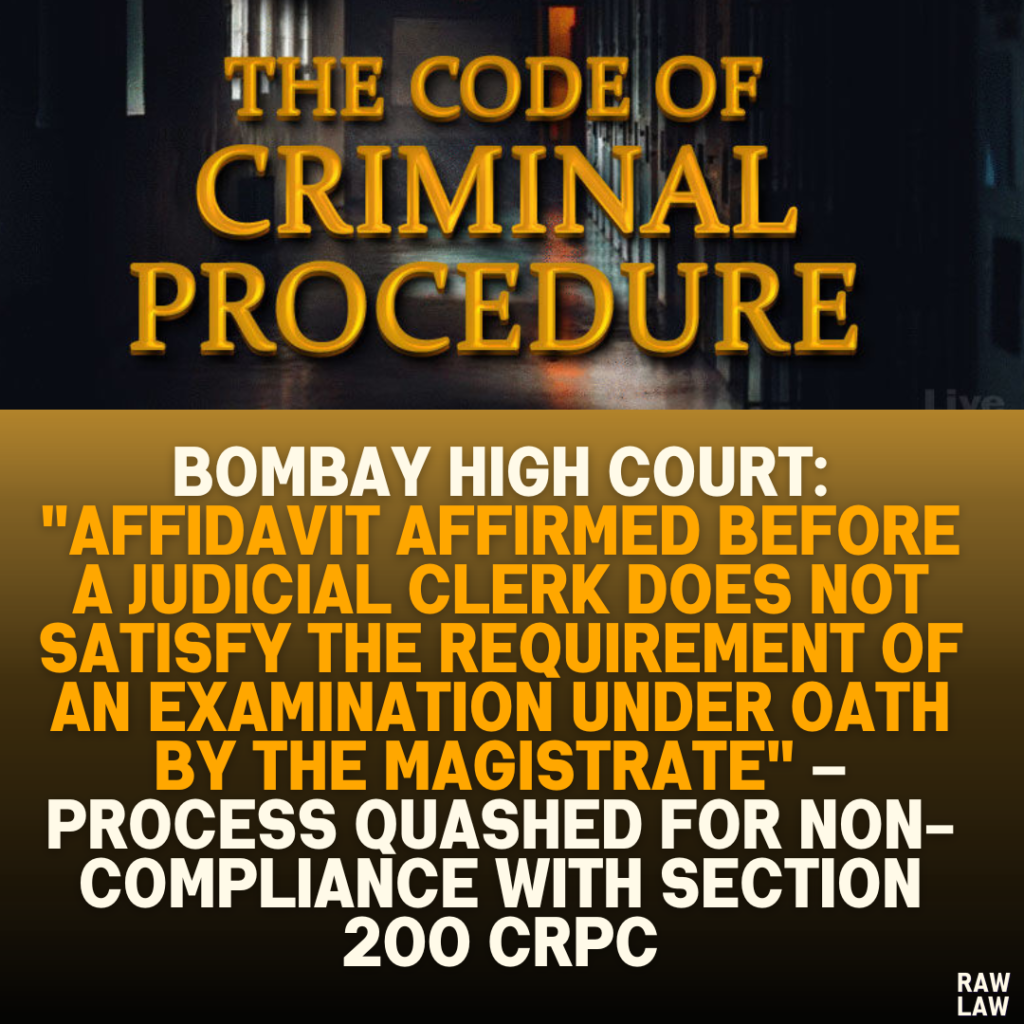Court’s Decision:
The Bombay High Court set aside the orders of issuance of process against the petitioners in CC No. 4810/SS/2019, observing that the mandatory requirement under Section 200 of the Code of Criminal Procedure (CrPC) was not fulfilled. The Court directed the Magistrate to record the complainant’s verification under oath as stipulated by Section 200 CrPC and then proceed with the complaint.
Facts of the Case:
The petitioners were accused in a private complaint filed by the second respondent under Section 138 of the Negotiable Instruments Act. The respondent’s verification statement was submitted in the form of an affidavit affirmed before a judicial clerk. The petitioners challenged the issuance of process, arguing non-compliance with Section 200 CrPC, which mandates examination of the complainant under oath by the Magistrate.
Issues:
- Whether the affidavit submitted by the complainant amounts to compliance with the requirements of Section 200 CrPC.
- Whether the issuance of process without an examination under oath renders the order invalid.
Petitioner’s Arguments:
The petitioners contended that the Magistrate failed to examine the complainant under oath as mandated by Section 200 CrPC. They argued that the affidavit filed before a judicial clerk could not substitute the statutory requirement of recording the complainant’s statement under oath.
Respondent’s Arguments:
The respondent maintained that the affidavit was sufficient verification for issuing process and that the Magistrate’s omission should not invalidate the complaint against the petitioners.
Analysis of the Law:
The Court emphasized that Section 200 CrPC requires the Magistrate to examine the complainant under oath to ascertain the truthfulness of the allegations. The Supreme Court, in a series of decisions, has reiterated that issuing process is a serious matter, and safeguards like examination under oath are crucial to prevent misuse of the process.
Precedent Analysis:
The Court referred to key precedents:
- Medmeme, LLC v. iHorse BPO Solutions Pvt. Ltd. (2018) 13 SCC 374.
- Vir Prakash Sharma v. Anil Kumar Agarwal (2007 SCC OnLine SC 957).
- Anil Mahajan v. Bhor Industries (2005) 10 SCC 228.
These cases underscored the importance of adhering to procedural safeguards under Section 200 CrPC before issuing process.
Court’s Reasoning:
The Court observed that the affidavit affirmed before a judicial clerk does not satisfy the requirement of an examination under oath by the Magistrate. It held that the Magistrate’s failure to comply with Section 200 CrPC rendered the order of process issuance illegal. However, the respondent should not bear the consequences of the Magistrate’s omission.
Conclusion:
The High Court quashed the impugned orders and directed the Magistrate to restart proceedings from the stage of recording the complainant’s verification under Section 200 CrPC. The complaint would then proceed in accordance with the law.
Implications:
This judgment reinforces the procedural safeguards required under Section 200 CrPC to ensure fairness and prevent abuse of the criminal process. It serves as a reminder for Magistrates to adhere strictly to statutory requirements when dealing with private complaints.




Pingback: Supreme Court Clarifies Impleadment of Civil Authorities in Bail Applications for Foreign Nationals: "Not Mandatory Unless Section 14 of Foreigners Act Is Invoked," Establishes Streamlined Communication Protocol - Raw Law
Howdy this is kind of of off topic but I was
wondering if blogs use WYSIWYG editors or if you have to
manually code with HTML. I’m starting a blog soon but have no coding know-how so I wanted to get advice from someone with experience.
Any help would be greatly appreciated!